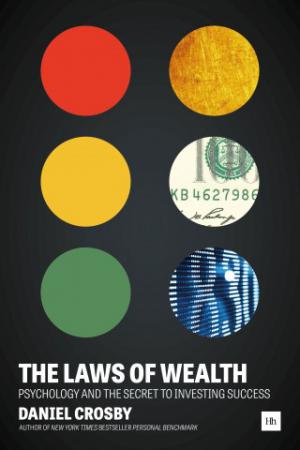
Warren Buffett’s mentor Benjamin Graham famously said, “The investor’s chief problem — and even his worst enemy — is likely to be himself.”
Graham sure knew his subject. Consider: The 30-year annualized return for the S&P 500 SPX, -0.36% average was 10.35% through 2015, but the average investor in the U.S. market pocketed just 3.66%, according to an analysis of investors by researcher Dalbar Inc.
How can you avoid leaving money on the table? The answer is to change your investing behavior so that you stick to a plan rather than act out of fear or greed. Most of the shortfall cited in the Dalbar study, in fact, was due to “panic selling, excessively exuberant buying and attempts at market timing.”
“The Laws of Wealth” is my attempt to curb this money-losing behavior. Here is an excerpt of the book’s 10 key guidelines to help you keep more of your investment gains:
1. In every market, you control what matters most
The highs and lows of the market may be out of your hands, but how you choose to behave is within your power, and is an important driver of returns.
2. Diversification means always having to say you’re sorry
Diversification is not a panacea, nor does it prevent your portfolio from falling, even dramatically, at times. What it does is protect you from idiosyncratic risk and losing your shirt on a concentrated bet. Buying a car with an airbag is a good idea, even if you never get in a wreck. Diversifying your portfolio is similarly wise, even if the benefits may not always be apparent.
3. Risk is not a squiggly line
Risk is not a paper loss. Risk is not underperforming your golf buddy. Risk is not even underperforming a market benchmark. Real risk is the probability of you permanently losing your money. Accordingly, investors with a long time horizon and diversified portfolios are taking on little risk compared to someone with a more concentrated, shorter time frame.
4. Forecasting is for weathermen
Famed contrarian investor David Dreman found that from 1973 to 1993, of the 78,695 corporate earnings estimates he examined, there was a one-in-170 chance that analysts’ projections would fall within plus or minus 5% of the actual number. The smartest people in the world don’t bother with the crystal ball. Said financier J.P. Morgan of the market’s future trajectory, “It will fluctuate.”
5. You cannot do this alone
Most people understandably assume that the greatest value offered by a financial adviser is, well, financial advice. Not so. Vanguard’s “Advisor’s Alpha” study shows that working with an adviser provides around three percentage points of outperformance, and that fully half of that value comes from behavioral coaching. Morningstar, Aon Hewitt, and Envestnet all have similar investor studies showing that hand holding is more important than stock picking when it comes to optimizing returns.
6. Excess is never permanent
John Neff, former head of Vanguard’s Windsor Fund, astutely noted that, “Every trend goes on forever, until it ends.” It has been said that nature abhors a vacuum and an investment corollary is that markets abhor excess. While short-term trends and emotionally fueled investors can push a stock up or down for a time, things tend to come back to Earth eventually. Betting that something will rise or fall in perpetuity is a risky bet.
7. Trouble is opportunity
Many investors are familiar with Buffett’s admonition to be “greedy when others are fearful and fearful when others are greedy,” yet so few of us manage to successfully view a downturn as the opportunity it truly is. There is true joy (and riches) to be had, so commit yourself to continue investing and even increasing your allocation when times are bad.
8. If it’s exciting, it’s probably a bad idea
Nobel laureate Paul Samuelson said it best, “Investing should be more like watching paint dry or watching grass grow.” Research shows that the average IPO in the U.S. has gone on to underperform the market benchmark by 21% per year in the first three years following its release. Emotion makes us a stranger to our rules, and straying from a discipline tends to end in disaster.
9. You are not special
Robert Shiller, a Nobel prize-winning economist, is fond of saying that “This time it’s different” is the most dangerous phrase in investing. While mania can carry a market for a time, the truth about what works long-term on Wall Street is pretty boring (think paying a fair price for a profitable company) and is unlikely to fundamentally change.
10. Your life is the best benchmark
Benchmarking to your own goals instead of arbitrary external ones has myriad benefits. First off, it personalizes the whole endeavor and makes investing about doing what you love instead of outperforming others. Research also shows that goals-based investors are more likely to stay the course during tough times and even save at higher rates, since what they are chasing is so personally meaningful.